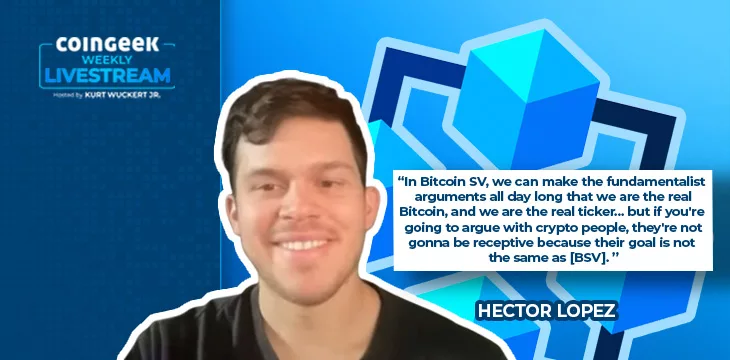|
Getting your Trinity Audio player ready...
|
Instasize founder Hector Lopez, who many Bitcoiners will be familiar with from social media, joined Kurt Wuckert, Jr. on the CoinGeek Weekly Livestream to talk about AI, blockchain, and winning in technology.
Who is Hector Lopez?
Lopez is an entrepreneur and co-founder of Instasize, an app designed to help internet users quickly and easily reformat photographs to formats that work on social media. His app has over 200 million downloads, so he knows a thing or two about running a successful tech company.
Lopez first heard about Bitcoin in 2013. He looked into how to mine it, but he wasn’t successful in finding a mining rig back then. However, he instantly got the value proposition—transferring value quickly and easily on the Internet. Later, someone told him that the BSV blockchain was a scam, so he decided to look into it and formed his own opinion that it’s definitely not a scam.
Blockchain and the problems it can solve
Wuckert asks Lopez what problems he would solve if he had a billion dollars and a magic wand. He says he’d like people to understand what problem blockchains can solve—it can tell us the absolute truth about what happened, allowing us to resolve disputes between different parties. However, it must scale globally to work for everyone to deliver that promise.
Wuckert notes that the space is still tiny, and barely anyone uses blockchain-based tools. He wonders if maybe blockchain is a bad idea (he doesn’t think so) and asks Lopez for his take on that. He replies that there will be a blockchain in the future, and BSV blockchain is actually a good measure of how useful blockchain technology is. The token’s price right now proves that not enough companies are finding use cases for blockchain, and the price going up will indicate when that changes. He likens it to the fastest vehicle that just needs to find a road.
Part of the problem right now is that users can’t get anything they want with Bitcoin, Lopez says. Starbucks tokens are more useful in that sense. However, the narrative being promoted by BTC is predatory and is preying on the most vulnerable; it works just like MLM scams, he rightly says.
Briefly talking about AI, Lopez says a lot is happening in the photo and video space. AI is a huge change, and it is empowering people to do more with less (e.g., ChatGPT can make coders more efficient). His firm uses AI to caption pictures and for image restoration. Again, it’s all about solving real problems for customers.
Ordinals, regulations, and Dogecoin
Wuckert points out that Lopez made quite a bit of noise about Ordinals when they first came out. Were they just a flash in the pan? Lopez says that, like anything, the initial hype has died down. Now, it’s all about finding use cases, and people are trying, but they’re going to run into the technical limitations of the blockchains they’re working on when they do.
What about regulations and the recent XRP ruling? Lopez reminds us that there’s an appeal process—anyone who follows Dr. Craig Wright’s legal battles will know that rulings can be overturned. He found the ruling ambiguous, noting that some XRP sales are securities, and the rest weren’t clearly decided on. Moreover, he points out that SEC Chairman Gary Gensler isn’t saying we can’t have tokens; he just says they need to be registered and comply with regulations.
How about Elon Musk rebranding Twitter to X and trying to make Dogecoin a global payments system? Lopez says the original idea of X.com was payments, and he doesn’t doubt Musk’s intention to build something useful, but whether Dogecoin can be improved upon to work at a global scale is another matter. If not, Musk will likely look for another blockchain that can.
Wrapping up, Lopez reminds us that simply claiming the BSV blockchain is the real Bitcoin won’t get us anywhere. Nothing in the industry is judged on its merits right now—it’s all about perceived future value. However, for anyone serious about blockchain, there’s only one scalable solution; BSV.
In order for artificial intelligence (AI) to work right within the law and thrive in the face of growing challenges, it needs to integrate an enterprise blockchain system that ensures data input quality and ownership—allowing it to keep data safe while also guaranteeing the immutability of data. Check out CoinGeek’s coverage on this emerging tech to learn more why Enterprise blockchain will be the backbone of AI.
CoinGeek Conversations with Houman Haddad: Blockchain helps UN humanitarian agencies to work together

 02-16-2026
02-16-2026 




